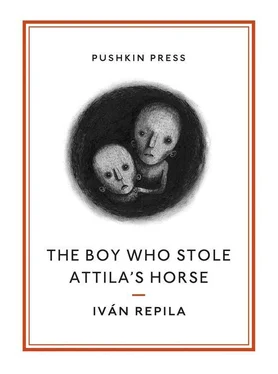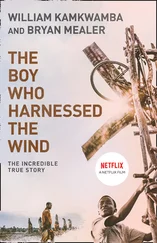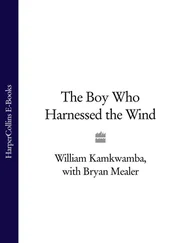‘Why are you telling me this?’
‘Because I want you to understand that I am not afraid of dying, I don’t base my life on the knowledge that one day it will all end. There are times when life presents circumstances where the only recourse is a radical move, an extraordinary sacrifice, and I can accept that. What I couldn’t bear, though, would be to see you grow up in a wasteland, like this well; a place to die with no peace, all because of the apathy of civilization. A cemetery in which to wither, like a flower that won’t ever help the land to grow. It is the thought of you dying that makes the world so small.’
SMALL HAS NAMED himself Inventor and he organizes cultural activities for his brother, although really he does it because he cannot stop imagining.
He has perfected what he has called ‘osteo-vegetable music’, which is what comes from hitting certain bones with dry roots. He rehearses on his own body, above all with his knees, hips, torso and collarbone. But what he’d really love would be to somehow rotate his head and arms and rock out on his spine. His extreme boniness makes him look like a misshapen neighbourhood made up entirely of street corners, and this affords him an inordinate range of obscure, high-pitched sounds which come together as a tune when he strums his tendons and thumps his stomach and chest. The result is a series of concerts with a hard, repetitive bass line, but which boast brief flashes of harmony so that, skeletal origins aside, one can appreciate a certain musicality. Apart from the symphonies, Small takes particular pleasure from his elaborate overtures, where with great ceremony he takes up position — to play himself — and explains the contents of the works with such unfeigned titles as ‘Kneecap and Ribs Song’, ‘Hungry Fingers’ and ‘At Night a Cranium’.
He also organizes outings to The Well Space, home to various temporary art exhibitions. He dedicates a lot of time to finger-painting on the walls: generally abstract pieces embellished with stones, roots and rotten leaves. Unfortunately he can only draw one or two works in the space available to him, and in order to make room for new installations he is obliged, much to his sadness, to delete the old ones. Had it been possible to preserve every one of them and arrange them chronologically, an astute observer would have picked up on his painstaking narration of life inside the well, a kind of pagan Stations of the Cross. Wolves Smelling Men, The Arrival of the Sea, First Worm , or The Bird of Virtuous Death were acclaimed works and only just missed forming part of The Well Space’s permanent collection.
Energy levels permitting, his creativity extends to another kind of pursuit, one that requires greater exertions: gestural theatre, folk dances, human sculptures and contortionism, activities that Big also takes part in on occasion. But the privation of recent times has reduced the number of festivals, much treasured when they do go ahead.
At the end of the day’s line-up, Big spends a few minutes applauding, whistling and hear-hearing like a doting public. Afterwards, if he finds Small in good spirits, he calls for an encore and bows in reverence until he gets one, at which point they fall about laughing at the unintended variations on the show, always unrepeatable.
A few hours later, famished and exhausted, they can hardly remember what they have done, seen or heard.
‘WHO ARE YOU?’ asks Small.
‘You know who I am,’ answers Small.
‘How did you get here?’
‘The same way as you. Falling into the well.’
‘Where have you been these past weeks? I haven’t seen you before.’
‘I kept quiet.’
‘And now you want to talk?’
‘Let’s.’
Big is snoring like a wild boar.
‘Am I going to die?’ asks Small.
‘Yes. One day. Does that worry you?’ answers Small.
‘Sometimes. When I’ve got things to say it scares me to think I don’t have time to say them. My brother thinks I hallucinate, but he’s wrong. It’s sort of an emergency.’
‘You’re not special in that regard.’
‘Yes I am. I think things the others don’t think. I see things the others don’t see, or if they see them they can’t interpret them correctly.’
‘You speak as if you know the truth.’
‘No. I speak as if I were tired of being wrong.’
‘And you’re not wrong anymore?’
‘No. It’s everything else that’s wrong. This well, the walls, the forest, the mountains. I’ve been confused for a long time, but I’m OK now.’
‘You don’t look OK.’
‘I’m going to die. I’ve never been better.’
‘Will we get out of the well one day?’ asks Small.
‘You, yes. In twenty-eight days,’ answers Small.
‘And my brother?’
‘The young boy sleeping over there will never get out. His bones will turn to dust here in this hole. Someone must die in order for you to live; you must know that by now.’
‘I don’t want him to die. He’s being strong for me.’
‘Many will be strong for you. You will show your gratitude when the time comes. To your brother, too.’
‘I don’t know how I ever could… I’ve got nothing to give them. There is a hole where other things should be.’
‘You can’t fight that. Nobody will be able to fill that hole, that hunger you feel every day. You can’t sate yourself.’
‘It’s like a prison sentence.’
‘I suppose it is. I’m sorry.’
‘Don’t be sorry. I had options, but I chose this path.’
‘And what do you think you will find at the end?’
‘It doesn’t matter. Maybe a punishment, or a reward. Maybe there’ll be pain, nothing but pain, a searing white pain that will leave me blind. I don’t care. Life is wonderful, but living is unbearable. I’d like to pare down existence. To pronounce over a century one long, inimitable word, and for that word to be my true testament.’
‘A testament for whom?’
‘For whoever understands it.’
‘Do you think I will be remembered?’ asks Small.
‘Perhaps by your contemporaries, by your generation,’ answers Small.
‘That’s not enough. I don’t know if I belong to any generation: none of my loved ones are my age. I will be remembered by all, until not one man remains on the earth.’
‘And why should you be remembered?’
‘For what I know. For what I am going to do. For surviving the well. For my visions. Because my words are new. Because I am big.’
‘No, you’re not. You’re Small.’
‘That is only a name.’
SMALL HUMS SOFTLY to himself like a ventriloquist’s dummy, while Big urinates blood and thinks that his time is up. A red puddle splashes the earth before being soaked up into it. Big sees it as his body’s final warning. Perhaps he’s pushed it too far. Or perhaps his kidneys were always going to pack up today, at this very moment, even if he had been living at home and eating normally. He covers the blood with brown earth and smiles.
‘Today,’ he says, ‘I feel wonderful.’
The absent look on his brother’s face makes him question whether Small, like him, is haemorrhaging blood and not saying so. Looking at his paper-thin body it seems impossible that it would survive blood loss. Then again, over these weeks he has shown that his desire to stay alive is great enough to survive even the gravest illnesses. That small, gaunt thing has battled against hunger, thirst, fevers, the cold and heat, and although his mind has begun to desert him, his spirit stands firm.
He envies Small’s indolence and self-absorption, and all the shades of grey that his world seems to contain.
Читать дальше












